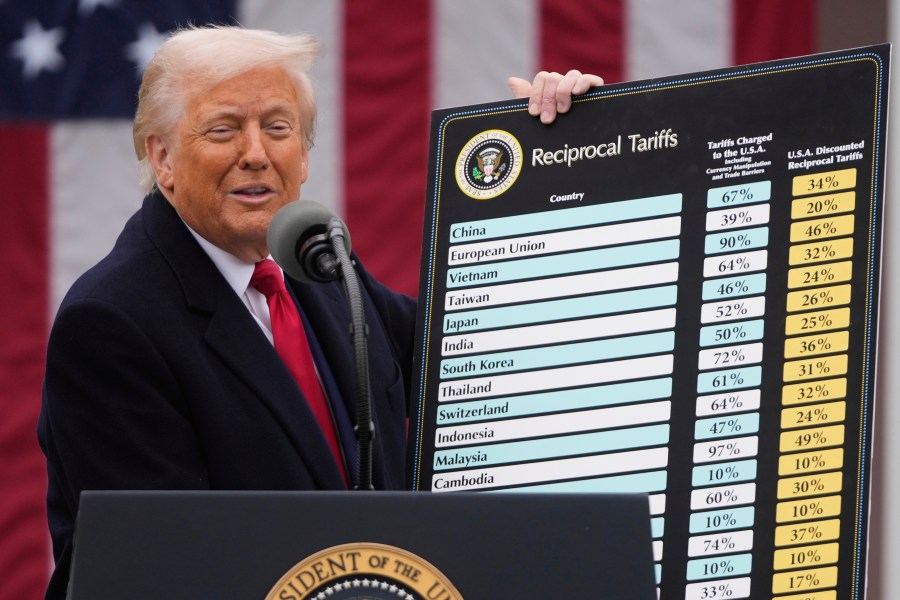World
Supreme Court to Decide on Trump’s Controversial Tariffs

The United States Supreme Court is set to deliberate on the legality of former President Donald Trump’s tariffs, following rulings from three lower courts that deemed his use of emergency powers to impose these tariffs illegal. The case is particularly significant as it marks the first time the Supreme Court will deliver a final verdict on one of Trump’s policies, with implications that extend to both political and financial realms.
Trump has heavily relied on tariffs as a cornerstone of his economic and foreign policy. He has previously stated that a ruling against him by the Supreme Court would be a “disaster.” According to government reports, the tariffs have generated approximately $195 billion in revenue through September 2023.
Legal Grounds and Challenges
The Constitution grants Congress the authority to impose tariffs; however, Trump has invoked extraordinary powers under the International Emergency Economic Powers Act of 1977. He argued that issues such as illegal immigration and drug trafficking constituted a national emergency, necessitating action against Canada, Mexico, and China in February. In April, he extended these tariffs globally, asserting that the United States’ trade deficits also warranted emergency measures.
In response, several libertarian-backed businesses and states have mounted legal challenges. They have successfully won rulings from a specialized trade court, a district judge in Washington, and a business-oriented appeals court, all of which found that Trump could not justify the tariffs under the emergency powers law, which does not specifically mention tariffs. Nonetheless, these courts allowed the tariffs to remain in place while the legal battles continued.
The appeals court referenced the “major questions” doctrine, a legal principle established by the Supreme Court requiring Congress to provide clear guidance on issues with significant economic and political implications. This doctrine has previously influenced the court’s decisions, leading to the rejection of various Biden administration policies related to the COVID-19 pandemic.
The stakes in the tariff case are considerably higher, with projections estimating that the tariffs could generate $3 trillion over the next decade.
Implications of the Rulings
Challengers have pointed to the writings of Trump’s appointees, Justices Amy Coney Barrett, Neil Gorsuch, and Brett Kavanaugh, as they urge the court to impose restrictions on this key Trump policy. Barrett has previously likened the decision-making process to a babysitter being given permission to spend money on fun activities. She stated that simply being told to “make sure the kids have fun” would not justify a costly, multi-day trip without clearer instructions from parents.
In contrast, Kavanaugh has suggested that the same limiting standards may not apply to issues of foreign policy and national security. Additionally, dissenting opinions from appellate judges have argued that Congress intended to grant presidents more leeway in exercising emergency powers.
Some businesses involved in the legal challenges are also arguing that Congress cannot constitutionally delegate its taxing power to the president. This notion, known as the nondelegation principle, has not been invoked in nearly 90 years. Gorsuch has expressed concerns about Congress ceding significant lawmaking power to the executive branch, questioning the implications of such a delegation on governance.
The Supreme Court has expedited its review process for this case, scheduling arguments less than two months after agreeing to hear it. This rapid timeline suggests that the court may be inclined to deliver a quicker resolution compared to typical high-profile cases, which can take six months or longer.
Recent actions illustrate the court’s ability to respond swiftly under pressure; it ruled on a TikTok-related case just a week after hearing arguments, reaffirming a law that could lead to the app’s ban unless sold by its Chinese parent company.
As the Supreme Court prepares to make a decision, the implications of its ruling on Trump’s tariffs could resonate across economic and political arenas, shaping future presidential powers and legislative authority in the United States.
-

 Science2 weeks ago
Science2 weeks agoInventor Achieves Breakthrough with 2 Billion FPS Laser Video
-

 Top Stories3 weeks ago
Top Stories3 weeks agoCharlie Sheen’s New Romance: ‘Glowing’ with Younger Partner
-

 Entertainment3 weeks ago
Entertainment3 weeks agoDua Lipa Aces GCSE Spanish, Sparks Super Bowl Buzz with Fans
-

 Business3 weeks ago
Business3 weeks agoTyler Technologies Set to Reveal Q3 Earnings on October 22
-

 Health3 weeks ago
Health3 weeks agoCommunity Unites for 7th Annual Into the Light Walk for Mental Health
-

 Health3 weeks ago
Health3 weeks agoCurium Group, PeptiDream, and PDRadiopharma Launch Key Cancer Trial
-

 Entertainment3 weeks ago
Entertainment3 weeks agoRed Sox’s Bregman to Become Free Agent; Tigers Commit to Skubal
-

 Entertainment3 weeks ago
Entertainment3 weeks agoMother Fights to Reunite with Children After Kidnapping in New Drama
-

 World3 weeks ago
World3 weeks agoR&B Icon D’Angelo Dies at 51, Leaving Lasting Legacy
-

 Health3 weeks ago
Health3 weeks agoNorth Carolina’s Biotech Boom: Billions in New Investments
-

 Science3 weeks ago
Science3 weeks agoNorth Carolina’s Biotech Boom: Billions Invested in Manufacturing
-

 Top Stories3 weeks ago
Top Stories3 weeks agoDisney+ Launches Chilling Classic ‘Something Wicked’ Just in Time for October









